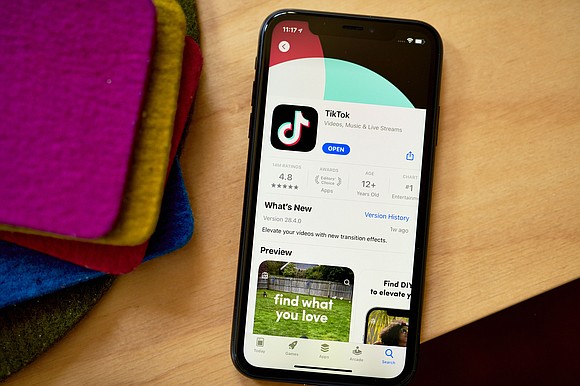Congress explores new bill to force sale/ban of TikTok in America
Brian Fung, CNN | 3/7/2024, 11:56 a.m.

A new bill that could ban TikTok from all US phones and tablets is set for a vote by a key House committee on Thursday, reflecting renewed bipartisan efforts to respond to national security concerns linked to the popular app.
The draft legislation would prohibit TikTok from US app stores unless the social media platform — used by roughly 170 million Americans — is quickly spun off from its China-linked parent company, ByteDance. The House Energy and Commerce Committee is reviewing the bill.
If enacted, the bill would give ByteDance 165 days, or a little more than five months, to sell TikTok. If not divested by that date, it would be illegal for app store operators such as Apple and Google to make it available for download. The bill also contemplates similar prohibitions for other apps “controlled by foreign adversary companies.”
It’s the most aggressive legislation targeting TikTok to come out of Congress since company CEO Shou Chew testified to lawmakers last year that the app poses no threat to Americans.
The bill was introduced with some bipartisan support earlier this week by Wisconsin Republican Rep. Mike Gallagher, who chairs a House select committee on China, and the ranking member of that committee, Illinois Democratic Rep. Raja Krishnamoorthi. The legislation also has the support of the White House and House Speaker Mike Johnson, though its prospects in the Senate are unclear.
TikTok is mounting a push against the bill, including trying to mobilize its user base.
The company has served some users with full-screen pop-ups in the app warning that the bill “strips 170 million Americans of their Constitutional right to free expression.”
“This will damage millions of businesses, destroy the livelihoods of countless creators across the country, and deny artists and audience,” reads the notification, a copy of which was reviewed by CNN.
The call to action concludes with a link prompting users to dial their members of Congress and express their opposition to the bill.
Speaking to reporters on the Capitol steps Thursday, Gallagher rejected characterizations of the bill as a TikTok ban.
“It’s not a ban,” he said. “It puts the choice squarely in the hands of TikTok to sever their relationship with the Chinese Communist Party. As long as ByteDance no longer owns the company, TikTok can continue to survive. People can continue to do all the dumb dance videos they want on the platform, or communicate with their friends, and all that stuff. But the basic ownership structure has to change.”
He also claimed that TikTok has been serving some users with notifications intended to promote opposition to the bill.
TikTok did not immediately respond to a request for comment on the legislation.
For years, US officials have warned that China’s intelligence laws could enable Beijing to snoop on the user information TikTok collects, potentially by forcing ByteDance to hand over the data.
Policymakers fear the Chinese government could use the personal information to identify intelligence targets or to facilitate mass disinformation campaigns that could disrupt elections and sow other chaos.
So far, the US government has not publicly presented any evidence the Chinese government has accessed TikTok user data, and cybersecurity experts say it remains a hypothetical albeit serious concern.
They also say governments can already buy vast troves of personal data from data brokers or use commercial spyware to hack individual phones with ease.
State and federal lawmakers have already banned TikTok from government-owned devices, but have repeatedly run aground in trying to broaden restrictions to Americans’ personal devices.
Last year, Senate lawmakers proposed legislation clamping down on TikTok but triggered concerns that it could give the executive branch too much power.
Efforts to ban TikTok date to the Trump administration, which used a series of executive orders to try to force app stores not to offer TikTok and to compel ByteDance to spin off the company. Those efforts also stalled amid legal challenges, though it led TikTok to engage in negotiations with the US government about how it could secure Americans’ personal data. Those talks are ongoing, even as TikTok has moved to store US user data on US-based servers controlled by the tech giant Oracle.
In Montana, a federal judge last year temporarily blocked a statewide ban on TikTok, calling the legislation overly broad and threatening Montanan users’ First Amendment rights to access information through the app.
A legislative factsheet from the sponsors of the House bill being considered this week claims the proposal does not censor speech.
“It is focused entirely on foreign adversary control—not the content of speech being shared,” the factsheet says.
But the overall effect of the bill would still implicate Americans’ free speech rights, according to the American Civil Liberties Union.
“We’re deeply disappointed that our leaders are once again attempting to trade our First Amendment rights for cheap political points during an election year,” said Jenna Leventoff, senior policy counsel at the ACLU. “Just because the bill sponsors claim that banning TikTok isn’t about suppressing speech, there’s no denying that it would do just that. We strongly urge legislators to vote no on this unconstitutional bill.”
And the bill would also threaten the free-speech rights of tech powerhouses Apple and Google, said a major trade group representing those companies.
“The government may not tell private parties, including digital service companies, what speech they may publish. The First Amendment forbids it,” said Stephanie Joyce, senior vice president of the Computer and Communications Industry Association. “The Protecting Americans from Foreign Adversary Controlled Applications Act would infringe the First Amendment rights of private businesses, including app stores, to curate and display content they believe is appropriate for their communities.”



